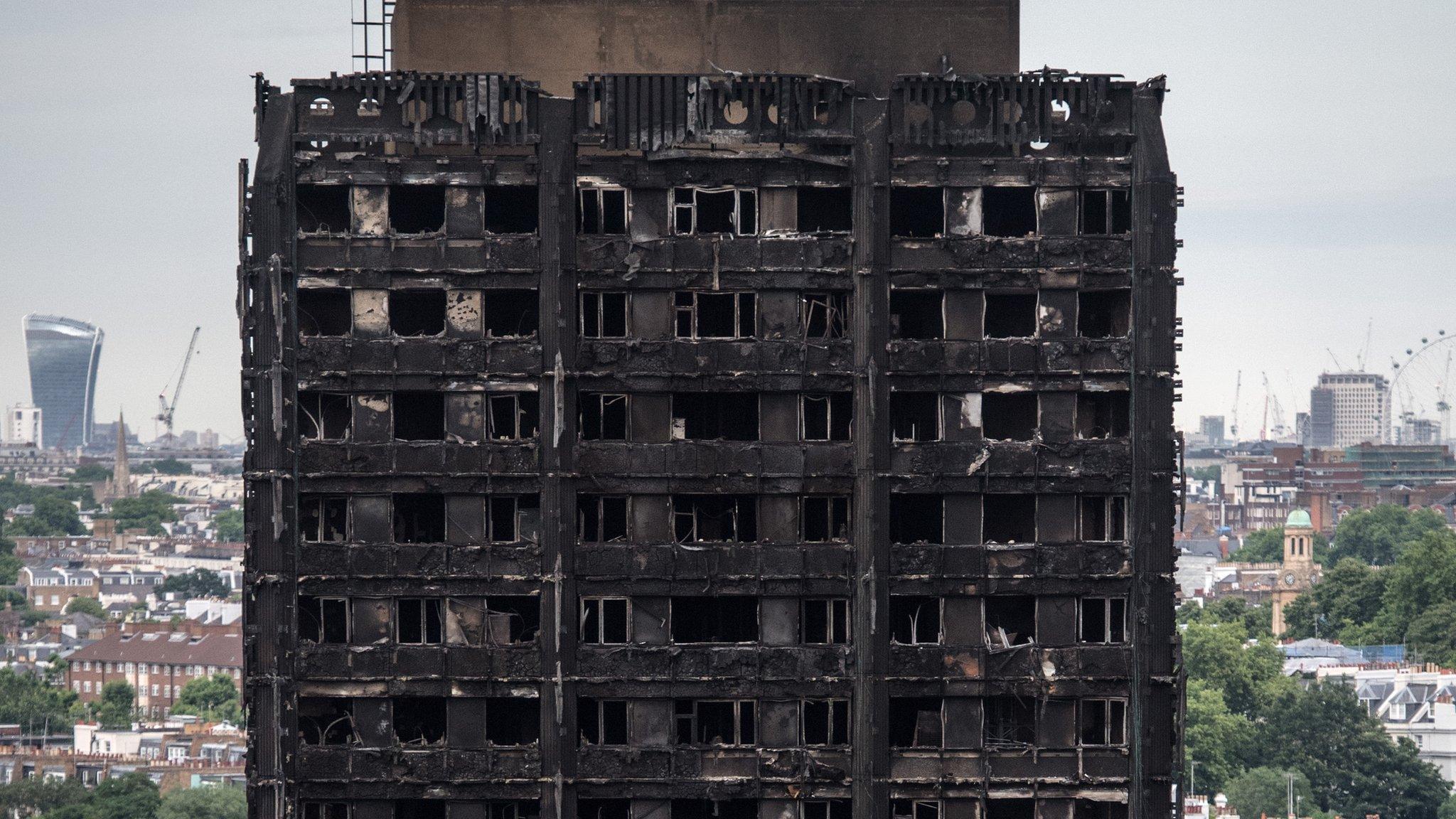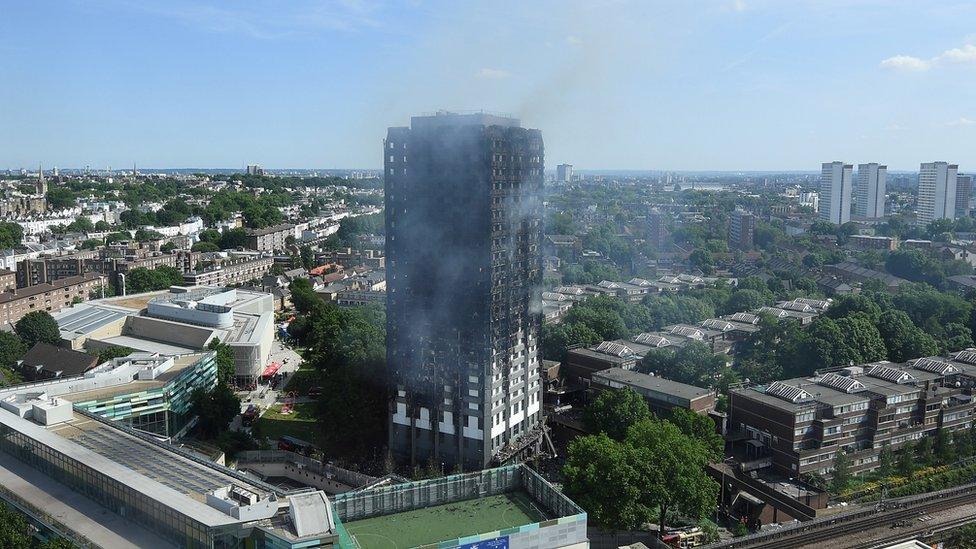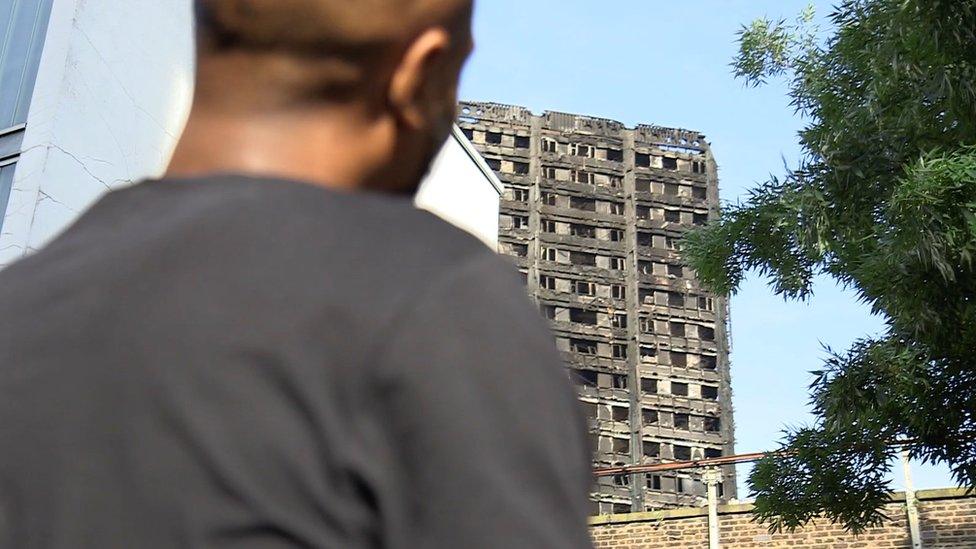Grenfell Tower: Residents confront minister over issues
- Published
Many Grenfell residents told the housing minister they wanted "actions before words"
Residents affected by the Grenfell Tower fire have vented their frustration at what they say is a lack of progress in dealing with problems.
They confronted housing minister Alok Sharma MP on why the homeless are not yet rehoused, in tense exchanges on the BBC's Victoria Derbyshire programme.
The minister told them people would be offered a suitable place to live within three weeks of the fire.
Later, the Prime Minister confirmed 120 tower blocks had now failed fire tests.
And police said 80 people were missing presumed dead, but a true total of those who died may not be known until at least the end of the year.
Grenfell resident Oluwaseun Talabi tells minister: 'I want permanent accommodation'
During the TV programme, residents and survivors set out their problems in the wake of the 14 June inferno.
"I am not moving my child from here, to here, to here, to here - I want permanent accommodation," Oluwaseun Talabi, who escaped the fire with his wife and young daughter, told Mr Sharma.
"I am not going to take any house you give me, it has to be suitable.
"I was happy in my house. I work hard. I want permanent accommodation,"
He and his family have been living in a hotel room after they "lost everything".
Mahad Egal, who escaped the fourth floor of Grenfell Tower during the fire in the early hours of 14 June, described how he had been offered alternative accommodation in a high rise block. He has refused it.
"My first priority is to put suitable accommodation over my children and my wife," he said.
"These people have the right to get back their dignity. Where is the dignity?" asked survivor Sid-Ali Atmani, external. "I don't want Theresa (May) to go to the TV, I want her to come (here)."
Haunted by victims
The group described the practical problems they have faced in being rehoused; trying to replace burned documents; accessing funding; being unable to return to work without a permanent base; and their dealings with the authorities.
They also spoke about the psychological impacts.
Many said they had not been able to sleep since the disaster, or were haunted by images of their escape and their friends, family and neighbours who perished.
Omar Alhajali, whose brother Mohammed died in the blaze, said: "When I see (his image), I remember everything. Not only now but every night... I can't sleep."
The group were hugely critical of the local council and the government's emergency response.
Kensington and Chelsea council provided no spokesperson for the programme's debate and they were empty-chaired.
Mr Sharma, the government's housing minister, arrived to answer their questions part-way through the show.
Survivors have themselves begun to compile a list of the victims as the current official number of people who died stands at 79, but it is expected to rise.
A woman who ran to help residents told the panel: "Check your moral compass"
They feel it will rise much further and are concerned the number is being downplayed.
Other residents have also voiced concerns - nearby blocks of flats and houses still lack hot water.
Simone Willis, a nurse who helped victims on the night, addressed a panel of politicians on the programme including the local MP Emma Dent Coad and London Assembly member Tony Devenish, saying: "When you're coming to these kinds of scenarios asking, 'what is needed?', think!
"You have a family, a mother, daughter, what would you need?
"This is not going to take a few shows, a few meetings, this is years of work."
Mr Sharma said the government guaranteed "people who have had their homes destroyed will be offered suitable accommodation within three weeks".
That timeframe leaves one week remaining. He initially said that would be "accommodation" and later said "temporary accommodation".
Everybody would have "good quality accommodation" he said, inviting them all to tell him their issues.
Oluwaseun Talabi talked about his survival as he revisited the tower, two weeks on
During the programme, residents raised the questions about the disaster they want to see answered by an inquiry.
They included:
How many people have died?
Why did the fire spread so quickly?
Will anyone be held to account?
Why were people told to stay put?
Will residents see the justice they want?
Afterwards, Mr Sharma said he was going straight to the Westway emergency relief centre to hold a surgery, external with survivors.
100% failure
At Prime Minister's Questions, Theresa May updated MPs on progress in dealing with the aftermath of the disaster.
She told MPs cladding on blocks across 37 local authority areas in England had failed tests for combustibility.
Given the "100% failure rate" she said local authorities had been told to get on with fire checks and any further necessary action.
She said 282 good quality temporary accommodation units had been identified, 132 families have had their needs assessed and 65 offers of accommodation had been made so far.
She said the lord chief justice would recommend a judge to head the public inquiry soon.
As of Wednesday morning, £1.25m had been paid to those affected and a further £1m would go to local charities and supporting groups, she said.
- Published27 June 2017

- Published19 July 2017

- Published28 June 2017

- Published29 June 2017